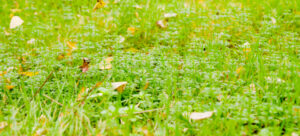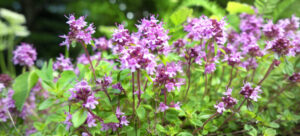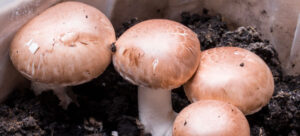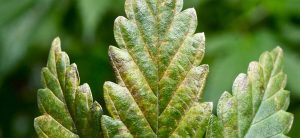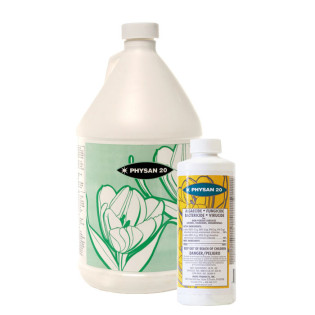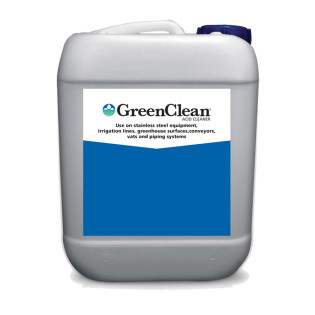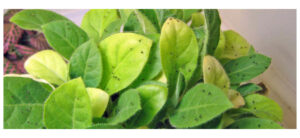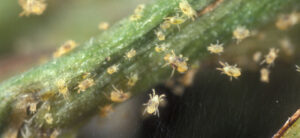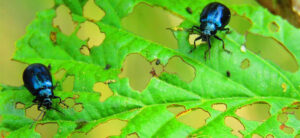
Tobacco Mosaic Virus is one of the plant illnesses that most growers never have to worry about depending on what they’re growing.
But, for those who do experience it, it can be detrimental to their grow. This is because its one of the few diseases with no real cure, making prevention of the utmost importance.
And if you experience it once, its likely it’ll return to your grow. That means you also need to know how to get rid of it and its presence from your garden even after you dispose of your sick plants.
We’ll teach you the symptoms of tobacco mosaic virus, our best tips for preventing it altogether, and what to do should you encounter it. First, we want to share some background information on what this disease is, and how it started.
What is Tobacco Mosaic Virus
Tobacco mosaic virus can infect more than 350 different species of plants. This virus, named for one of the first plants it infected in the 1800s (tobacco), is now one of the most damaging diseases.
It can affect crops like tomatoes, beans, roses, potatoes, peppers, cucumbers, and yes - tobacco. It is found throughout the United States and can be tough to detect and eliminate.
Tobacco mosaic virus was first identified in 1892 and can be transferred rapidly (and easily) from one plant to another.
You may notice symptoms right away, or it might take some time for problems to arise. The disease can only live for a month in wet soil, but on dry ground or in leaf debris (and plant matter), it can live as long as two years.
How Did My Plants Get Tobacco Mosaic Virus?
Tobacco mosaic virus can be spread in many ways, but usually, it overwinters on perennial weeds. When insects feed on those weeds, they spread the virus to other plants.
There are all kinds of pests that can spread the disease, from whiteflies to cucumber beetles. Aphids and leafhoppers can also transmit the disease.
You may even learn that the disease was spread to your plants via infected soil, seeds, or starter pots. Clones and divisions taken from infected plants can spread the virus, too.
Tobacco mosaic virus can even be spread by you. When you work with your plants - whether you’re stalking them, removing suckers, or harvesting your fruit - you unknowingly move the virus from one plant to another.
Symptoms of Tobacco Mosaic Virus
It can be tough to detect tobacco mosaic virus, as the symptoms look similar to those of many nutrient deficiencies.
They can also vary depending on the age of the plant.
However, if your plants are suffering from tobacco mosaic virus, you may notice symptoms like white, yellow, or green spots, streaks, and stripes on the foliage.
The leaves may become curled, wrinkled, or smaller in size. Your plants may also develop yellowed veins on the leaves, too.
Overall, your plants will likely suffer from stunted growth and poor yields. If your crops have already set fruit, those fruits might appear mottled or even as though it has warts.
Preventing Tobacco Mosaic Virus

We need to discuss preventative measures for the tobacco mosaic virus because prevention is all you really have in your arsenal. There is no plan B, as few treatment methods have proven effective for this illness.
We’ll cover this more in-depth later on, but let’s get into the best ways to prevent tobacco mosaic virus.
Purchase Resistant Plant Varieties

The best way to prevent tobacco mosaic virus is by planting varieties that are resistant to the disease. Although this is not a totally foolproof measure, it can help prevent long term damage to some extent.
You should always purchase seeds and transplants from a reliable source, too, to reduce the likelihood of disease and other problems.
If you’re growing tomatoes, for example, you may want to consider cultivars like ‘Big Beef, ‘Sungold,’ ‘Geronimo,’ and ‘Pink Wonder.’
Weed Regularly
Weeds pose all kinds of problems in the garden. Not only do they suck up moisture, oxygen, and nutrients that your plants so desperately need, but they also can spread disease and provide a safe haven for insect pests.
Don’t let weeds hang out in your garden. Instead, remove all weeds (especially perennial weeds) that are within 100 yards of your garden plot. Simply keeping a clean garden is one of the most effective treatment methods for tobacco mosaic.
Wash and Disinfect All Tools
At the end of each growing season, take the time to clean all of your tools and equipment.
Disinfecting should ideally be done more often than that - such as after each use - but if you can only get to this chore once per growing season, make sure it happens!
Remember, tobacco mosaic virus spreads through contact with infected plants. Anything that came into contact with an infected part of a plant should be cleaned with one part bleach to four parts water.
That includes stakes, ties, benches, pots, and tools. Make sure you wash your hands thoroughly before and after time spent in your garden, too.
Don’t Work in Wet Weather
Maintaining good watering habits is important when it comes to growing a healthy garden. It can prevent a variety of fungal and viral diseases and also help your plants grow stronger and healthier.
Water first thing in the morning so your foliage has plenty of time to absorb the moisture and dry off before the sun goes down at night.
Also, avoid working in your garden during periods of wet weather. Viruses spread more easily when the plants are already wet.
Avoid Tobacco Use
Yes, it’s yet another person telling you to quit smoking! However, refraining from tobacco use (at least around your plants) is vital if you are concerned about tobacco mosaic virus.
Believe it or not, tobacco mosaic virus can be spread via tobacco products. Any bits that drop onto your plants can cause them to become infected.
Get Rid Of Sick Plants
As difficult as it might be for you to come to terms with this, you’re going to need to give up on your infected, sick plants.
Pull them immediately and destroy them so that they do not infest the rest of your garden. Whatever you do, do not compost them.
The virus can live in the compost - no matter how hot it gets - and infect future generations of plants. You are best off throwing the infected pieces in the trash.
How To Treat Tobacco Mosaic Virus
Unfortunately, there are no proven treatments that can successfully treat tobacco mosaic virus.
Fungicides generally do not have any kind of effect on this devastating disease. Therefore, it’s important to incorporate the preventive measures listed above to keep tobacco mosaic out of your garden for good.
Once it sets in, it can have disastrous effects. Practice good garden hygiene and do not save seeds from infected crops. You will also want to take some steps to prevent the further spread of tobacco mosaic virus in your garden.
Final Thoughts On Tobacco Mosaic Virus
Sadly, tobacco mosaic virus is one plant disease for which there is really no cure. It can reduce your yields and completely stunt your plants’ growth, making it difficult to produce a viable crop.
While there’s nothing you can do but grin and bear it once your plants develop this disease, there are many steps you can take to prevent tobacco mosaic virus in your garden.
Ultimately, understanding how to get rid of tobacco mosaic virus comes down to some simple steps of basic hygiene and good maintenance in your garden plot.

